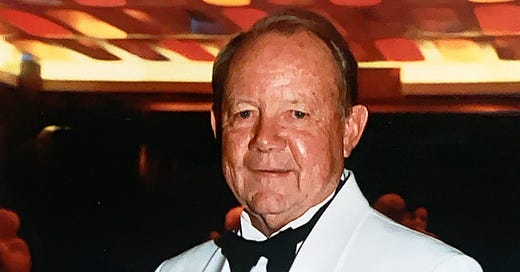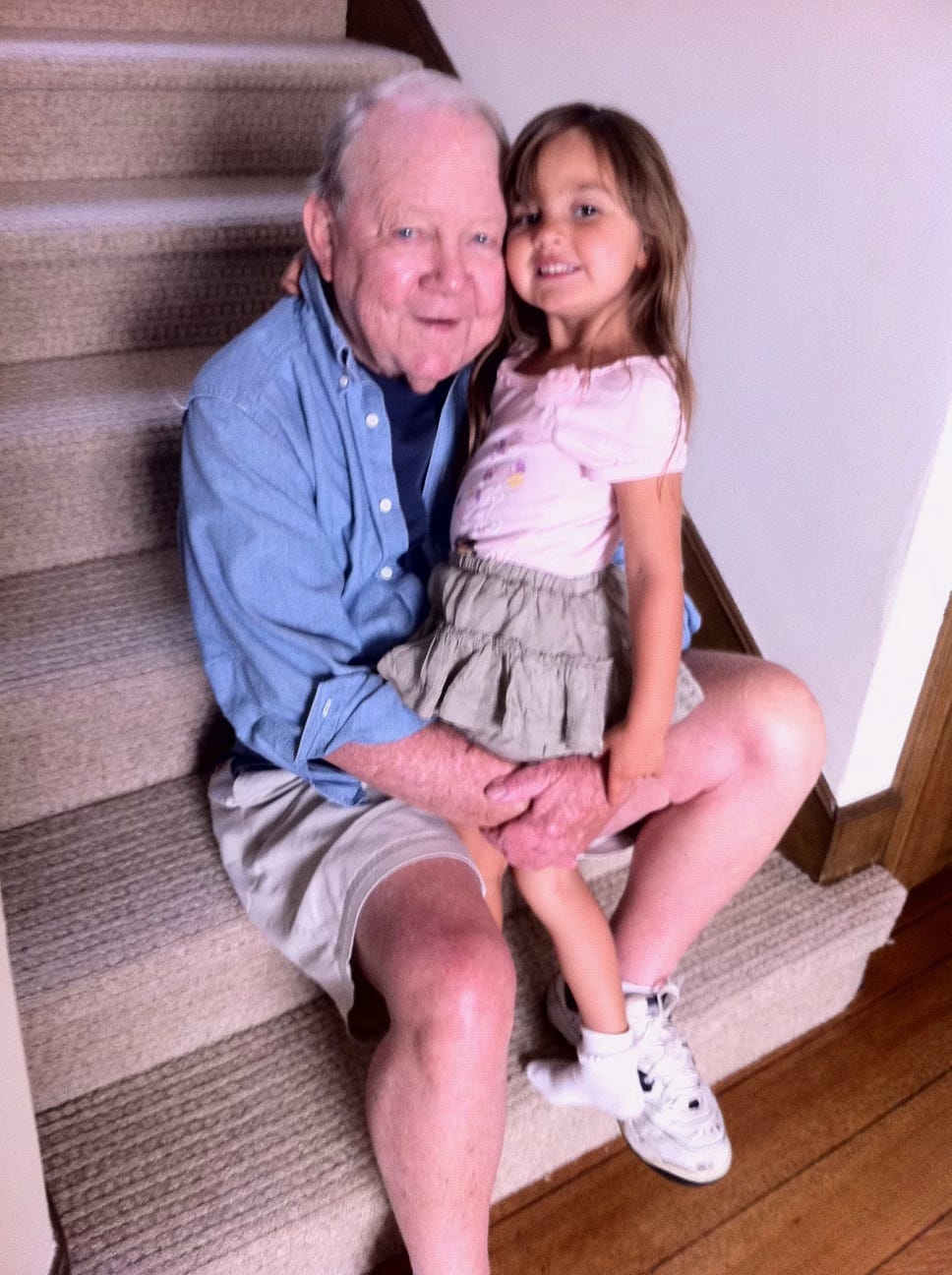Memorializing My Dad, Bren Ferguson (1936 - 2023)
Bonding with my dad through the movie “Field of Dreams.”
When my father, Bren Ferguson, passed away at 86 from complications of lung disease on February 10th, he left behind a legacy of compassion for the youth.
He was passionate about building an image of self worth among children with troubled backgrounds. For more than 30 years, he taught social studies to high school kids who would be temporarily detained at the Juvenile Hall for San Mateo County.
When I was a child, there were always VHS tapes in the VCR machine to record educational documentaries to show his class. “Don’t you make them read books?” I once asked him.
“Sometimes, but many of my students may only be in my class for a week,” he told me. “You have to be creative, especially because some of them have short attention spans.”
My father graduated with a history degree from San Jose State University in 1966 at a time when its track team, known as Speed City, was a powerhouse of African American athletes who were also outspoken on racial issues. While my dad didn’t run track, he was likely influenced by the environment, leading to his support for racial equality.
In one of his first teaching jobs out of college, he expanded the social studies curriculum at San Lorenzo’s Arroyo High School to include Black History and African history courses as electives.
A memorial service was held March 25th, 2023, in Menlo Park. Read the eulogy I gave that day at the church.
That same year, 1968, San Jose State sprinters Tommie Smith and John Carlos won gold and bronze medals, respectively, in the 200 meters for the US at the 1968 Summer Olympics. On the medal podium, they bowed their heads and raised their gloved fist in a “Black Power” salute to protest racial injustice during the medal ceremony.
My dad loved the Olympics. Therefore, he must have been ecstatic when he had the opportunity to hire a 1968 Olympics swimmer as an assistant coach for his swim program at the Belameda pool in Belmont. It was 1975 or ‘76 when Suzy Jones Roy, the one-time world record-holder in the breaststroke, saw an ad for the job in the newspaper and applied.
“I have good memories coaching with him. He was a good mentor to me when I was beginning my coaching career,” said Roy, who still coaches at Ladera Oaks Swim and Tennis Club. “He really made coaching fun.”
Summer Olympics with Dad
When I was 12, my older brother Mike and I joined my dad on a trip to the 1984 Summer Olympics in Los Angeles. We got to witness Carl Lewis win gold in several track and field events. Months later, we got to relive that event when comedian Eddie Murphy impersonated Lewis on an HBO comedy special. Standing on a track in runner’s gear, Murphy, in character, told a reporter, ”I race horses… No man can beat me. I’m Carl Lewis!” It was pure comedy gold. My brother, dad, and I debated whether it was as enjoyable as the real event.
Obituary: Read about my dad’s swim coaching and teacher-activist days.
During the Olympics, we stayed at the home of my dad’s childhood best friend, Don Vincent. When Vincent died early in the pandemic of COVID-19, it sent Dad into depression for weeks. My dad was crying on the phone when he shared the news with me.
When I visited later that day, he reminisced about the times Don and he had shared growing up in Southern California, riding bikes in the San Gabriel Mountains and the mischief-making they did, like most kids. One story included getting caught cooling off in a fish pond in front of a stranger’s house, high atop the La Canada hills, part of my dad’s paper route. Recalling those moments recently put a smile on my dad’s face. He said it was awkward when the homeowner spotted the teenage trespassers, but instead of scolding them, he offered to upgrade their amenities.
“Hey kids, if you want to go swimming, you can jump in my pool, instead of my pond.”
1991: With Steve Garvey at Dodger Fantasy Camp
Throughout most of the pandemic, my dad had been confined to his second story apartment, because he suffered from chronic obstructive pulmonary disease (COPD), a progressive and irreversible lung disease. In the past few years, he often got winded easily due to his weakening heart. This often caused memory lapses, anxiety and restlessness.
I brought my dad groceries on a weekly basis. Quite often, I’d walk in as he’d be watching ESPN or the Olympic Channel. One day in the summer of 2020, I came over to find him watching Men’s USA basketball team pairing off against Spain. At first glance, I wasn’t sure if it was a live event from the bubble of Tokyo that month, or if it was a rerun from years past.
“I think this is our best team ever,” he told me, snubbing or forgetting about the 1992 Dream Team. On the TV, future Hall of Famers Chris Paul and LeBron James led a fast break. Then at the last second, Paul passed it to the late Kobe Bryant, trailing from behind and finishing with a spectacular dunk.
It was clear, at least to me, we were watching the 2008 USA-Spain rerun, since Bryant died in a helicopter crash ten months earlier. I didn’t have the heart to tell him this was a game from three Olympics ago. It would have been like calling out spoilers in the middle of a movie.
Sharing a special moment with his granddaughter, Alexis
My dad was born on April 15, 1936 in Los Angeles. Years later, that date, minus the year, would go on to have historical significance in American race relations and Major League Baseball. On my dad’s 11th birthday, he huddled around the family radio with his father to hear Brooklyn Dodgers’ Jackie Robinson break the color barrier as the first African American to play in the Majors. Brooklyn was the team my dad and his father rooted for, because it was the one team they could get simulcast from a New York station into their Los Angeles-area home.
Robinson was also a local kid, a four-sport athlete from UCLA. Three years after that 11th birthday, my dad would enroll as a freshman at John Muir High School, the same Pasadena high school where Jackie Robinson had graduated.
When news broke in 1958 that the Dodgers were moving to Los Angeles, my dad got a phone call at Travis Air Force base, where he was stationed in the military.
It was his father. “I’m getting tickets to opening day! Can you make it home for the game?”
Sure enough, he did, as this was one of my dad’s favorite stories to retell throughout the pandemic.
Bonding Through “Field of Dreams”
One day in late February 2022, my dad suffered a fall in his apartment. Luckily, he didn’t break any bones, but it shook him up. For the next three days, I visited and tried to cheer him up. We watched a trio of his favorite baseball movies. The first two, “Bull Durham” and “A League of Their Own” barely got a reaction out of him. I wasn’t sure if he was depressed about his declining condition or if the fall affected him mentally.
On Sunday, we watched “Field of Dreams,” a fantasy drama starring Kevin Costner as Ray Kinsella, an Iowa farmer haunted by voices in his cornfield. He nearly goes bankrupt after ploughing over his cornfield to build a baseball diamond, encouraged by the voices. Kinsella thinks it’s a way to resurrect the ghosts of his childhood baseball idols.
I didn’t understand why my dad liked that movie so much, until this particular February day.
In the middle of the movie, my dad broke his silence, unraveling the layered reasons.
“You know my dad built a baseball diamond in our backyard when I was a kid,” he said.
“Yes, I remember you telling me that,” I said.
My dad grew up with a pet horse named Lucky on one-and-a-half acres of land in La Canada. My dad was the middle child of three boys, born five years apart. My late grandfather, George Ferguson, built the diamond for his boys, and angled it so the oak trees that separated the neighbors’ properties, served as a line of defense from home runs smashing neighbors’ windows.
Lucky was their regular right fielder, munching on bales of hay while the boys played ball.
As we watched “Field of Dreams,” I wondered if my dad could recall what he had told me a while back about a challenge his older brother, Skip, offered him and his younger brother, Dennis.
“Sure! You get an extra run if you can hit Lucky out there,” my dad said. That recollection brought a smile to his face.
“Did you ever hit him,” I asked my dad.
“No, we didn’t,” he said. “But Skip did.”
“He did? Did Lucky yelp?” I asked.
“No, it hit him right in the meaty part of his rump.”
As “Field of Dreams” wound down that day, we stopped talking as Kinsella began to reveal his regrets about his relationship with his father. Just then, it became clear that my dad’s childhood ballpark was a secondary connection to this movie he so loved.
When my paternal grandfather divorced my grandmother, my dad took it hard, leading to a rocky father-son relationship for years until his father’s death. This is something I think my dad would have wished he had resolved before his dad passed away.
In the final scene, Kinsella finds himself face-to-face with the ghost of his father, taking off his catcher’s gear at the end of a game.
“Hey Dad, would you like to have a catch?” asks Kinsella, all teary-eyed.
As the credits rolled as they played catch, I looked over at my dad. His blue eyes teary-eyed as well.
I realized how much it meant to him, that we played catch in our driveway, after seeing the movie together for the first time in the theater, three decades ago.
If you’re new here—hi, I’m Kevin.
The Centenarian Playbook is my newsletter, which usually features longevity tips and stories from Grandma Kay’s long life. It also includes stories of the Gemello Winery, which her late husband, Mario, ran for nearly half a century. Today’s post was a slight deviation from the usual stories.
I’m the author of 🍷 Rain on the Monte Bello Ridge,🍷 my forthcoming memoir about health, aging and winemaking. (Read the origin story of the book.) 🍇








Very well done Kevin. That’s one thing we all boys have in common with our fathers. The love of sports. Great tribute!
Lovely tribute! My dad was also stationed at Travis Air Force Base around the same time. Small world!